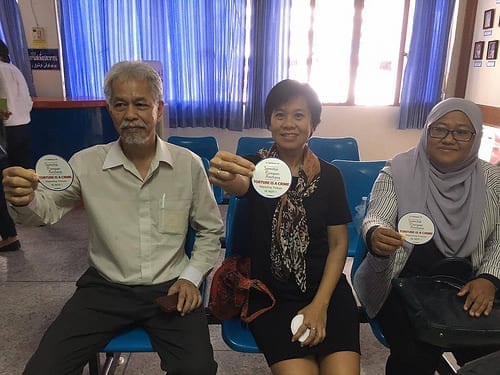
Feb 23, 2017
The global labor and human rights communities are urging the government of Thailand to drop charges against three human rights defenders who recently released documentation of torture in the country’s three southern provinces, home to a Muslim and ethnic Malay majority.
A decision by Thailand’s public prosecutor on whether to prosecute Somchai Hom La-or, Pornpen Khongkachonkiet and Anchana Heemmina on criminal defamation and computer crimes is expected any day. The charges carry a maximum penalty of seven years’ imprisonment plus fines of up to 300,000 baht ($8,330).
The report, “Torture and Ill Treatment in Thailand’s Deep South,” published in February 2016, describes 54 cases of alleged torture by the Royal Thai Police and Royal Thai Army. The human rights nonprofits, Cross Cultural Foundation (CrCF) and Duay Jai Group published the report.
In May 2016, Thailand’s Internal Security Operations Command filed a complaint against the three, claiming the reputation of the army was damaged by the allegations, and alleged the human rights activists had not cooperated with authorities to provide more information on the cases raised in the report.
“The charges are used to shut up human rights defenders, but we will not back down from exposing rights violations,” Somchai Hom La-or said last year after being charged with defamation.
“For a conflict-ridden region like the deep south, we need to expose human rights violations to bring true peace.”
The global labor and human rights communities are urging the Thai government to drop charges against the three and amend the nation’s penal code to remove criminal penalties for defamation.
Hom La-or, a CrCF advisor, is founder and secretary-general of the Human Rights and Development Foundation (HRDF), a Solidarity Center partner that focuses on migrant worker rights. He has actively defended human rights in Thailand for decades, since the start of the country’s modern human rights movement. In October 1973, while studying for a law degree from Thammasat University, Somchai Hom La-or became a leader in the mass student-led protests against the military dictatorship that had ruled the country for over a decade.
Pornpen Khongkachonkiet is director of CrCF, which assists marginalized communities, especially torture victims and their families in Southern Thailand, access justice. Anchana Heemmina is founder and director of Duay Jai Group (Hearty Support Group), and Patani Human Rights Organization Network.
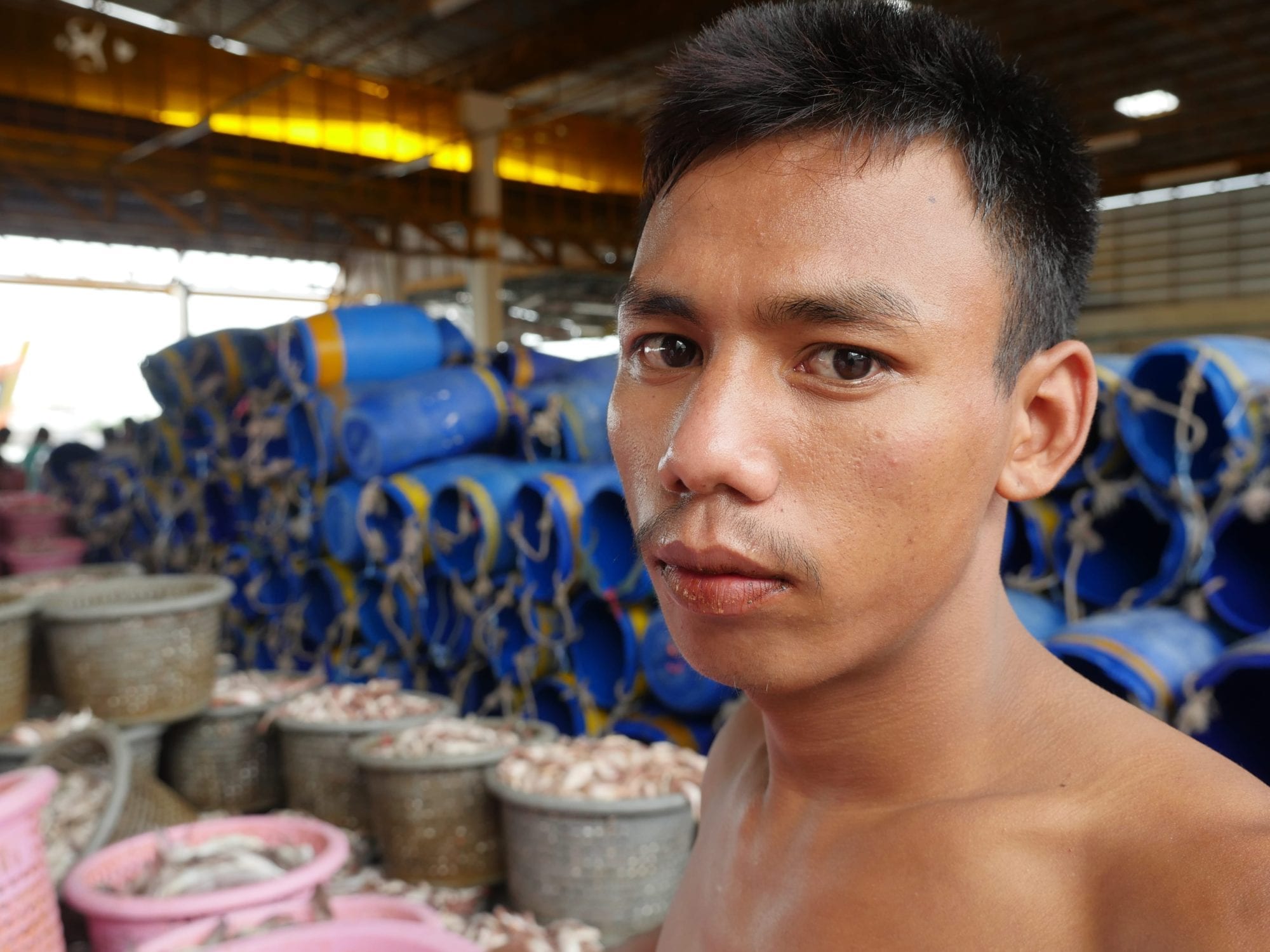
Feb 14, 2017
The toxic spread of xenophobia, racism, misogyny and fear marginalizes millions of migrant workers and refugees—further disenfranchising people whose jobs do not lift them from poverty, afford them safe workplaces or uphold their dignity. The Solidarity Center is fighting this ugly trend through programs that recognize the human rights of workers, support their dreams of a better life and ensure their safety on the road and at their destination.
In 2015, more than 240 million people were international migrants, most having bravely risked the unknown for an opportunity at a better future or to escape violence, repression and injustice at home. This mass movement of people is the backbone of wealth created in the global economy, and it has the potential to be a positive force in the fight against poverty and inequality.
Labor migration—which accounts for 150 million international migrants—generates billions of dollars in economic activity every year. For individuals, a job in another country, under the right circumstances, can provide a life- and family-sustaining career. Hundreds of thousands of African workers who cross borders on the continent, for example, moving means finding paid work where none exists at home. Meanwhile, another 65 million people globally have fled tragedy, persecution and war, uprooting their families to seek what most people want: a stable, safe life.
Despite their varied motivations for leaving, these women and men have one thing in common: They all deserve respect, decent work and dignity.
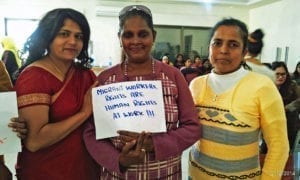
Domestic workers in Jordan formed a worker rights network that includes migrant workers from Bangladesh, Indonesia, the Philippines and Sri Lanka. Credit: Solidarity Center/Francesca Ricciardone
The Solidarity Center works around the world to ensure that the rights of migrant workers and refugees of any category are respected, and partners with unions and worker-rights organizations to extend workplace protections to all workers. Together, we focus on creating safe migration processes for workers, including greater regulation of labor recruiters and the elimination of recruitment fees to prevent debt bondage. We also support the creation of networks among partners in origin and destination countries to ensure that migrant workers are protected along their journey. In 2016, we had migrant rights-supporting programs in 21 countries, reaching more than 15,000 workers.
The Solidarity Center also engages with partners to defend against xenophobia, racism and discrimination toward migrant workers, advocating for equal treatment and full rights for all workers. In addition, the Solidarity Center is exploring how unions and labor-support organizations may help promote integration of refugees and displaced persons into labor markets, breaking down the artificial categories used to divide workers, degrade working conditions and lower wages.
For example:
In Mexico, the Solidarity Center and its partners organize migrant workers, in their communities and prior to departure, helping them know and defend their rights, and resist rampant exploitation in the labor recruitment system.

Haitian workers in the Dominican Republic have few rights on the job. Credit: Solidarity Center/Ricardo Rojas
The Solidarity Center has partnered with unions and worker associations in the Dominican Republic to organize Haitian migrant workers and their descendants, who work in agriculture, domestic work, construction and as market vendors. We have supported trainings on worker rights and the legal processes to regularize their status in the country.
Also in the Americas, we support migrant agricultural workers in Costa Rica from Nicaragua and Panama. These workers, who occupy the most precarious jobs, are legally excluded from the rights that other workers enjoy. We help them as they build new unions, promote migrant worker leaders and push for collective bargaining agreements—establishing wages that can lift them out of poverty.
In Thailand, we support workers from Cambodia, Laos and Myanmar—fleeing poverty, conflict, repression and climate change—by helping unions and nongovernmental organizations develop capacity to represent migrant worker and refugee populations, and ensure their access to labor rights.
The Solidarity Center-supported online labor rights portal, Wedabima in Sri Lanka was accessed by users more than 250,000 times across 140 countries between April and September 2016. Tens of thousands of Sri Lankans working abroad accessed the Sinhala-language website, including those working in South Korea (73,933 sessions); Kuwait (46,827 sessions); Qatar (33,317 sessions); the United Arab Emirates (27,468 sessions); Israel (16,950 sessions); and Saudi Arabia (10,272 sessions).
The Solidarity Center also fights human trafficking around the world. For example, we assisted the repatriation of migrant workers who had been trafficked to Malaysia from Indonesia, and helped—in collaboration with the Indonesian Migrant Workers Union (SBMI) and Jakarta Legal Aid Association—Indonesian seafarers who had been trafficked onto foreign fishing vessels in Trinidad and Tobago win restitution.
The Solidarity Center provides pre-departure training and other resources to workers in Kyrgyzstan who emigrate to Russia in search of jobs. Our programs and materials explain the legal rights of migrant workers, the conditions they may encounter as migrant workers, and sources of assistance if they encounter problems.

Fauzia Muthoni Wanjiru from Kenya describes her ordeal as a domestic worker in Saudia Arabia at the Solidarity Center labor migration conference. Credit: Solidarity Center/Evidence Holdings
And in January 2017, the Solidarity Center convened more than 130 union leaders, migrant worker rights advocates and international human rights officials from nearly two dozen countries and 57 organizations in South Africa for the conference, “Achieving Fair Migration: Roles of African Trade Unions and Their Partners,” to raise migrant worker voices, assess the challenges faced by migrant workers, share strategies for empowering them and map out plans for changing policies and laws to provide migrant workers fundamental workplace rights. (See also the AFL-CIO statement, “Attacking Immigrants and Refugees Hurts All Working People.”)
We are working on the frontlines with migrant workers, standing up for opportunity, dignity, fair economies and worker rights. Will you help us do more? Your donation will support our redoubled efforts in 2017 to fight dangerous trends to diminish worker rights.
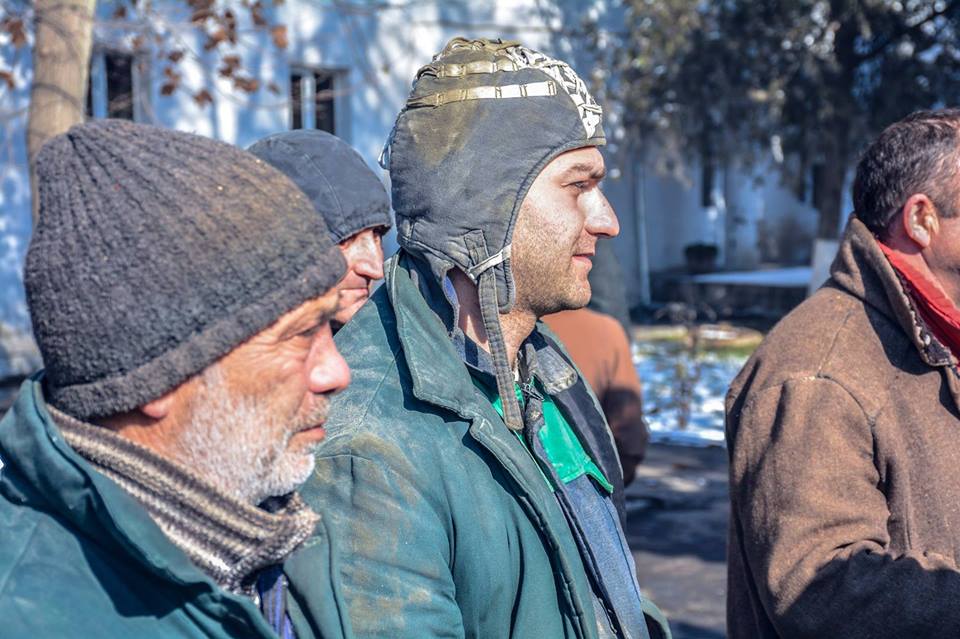
Feb 13, 2017
Some 350 workers at the Georgia chemical company Rustavi Azot recently were dismissed without notice or compensation and nearly 2,000 more threatened with firing unless they accept new, short-term contracts. The actions by the company, which produces mineral fertilizers, ammonia, sodium cyanide and nitric acid, generated protests in Rustavi and Tbilisi, garnered international support and prompted local media speculation about potentially questionable business dealings by the company’s former owner, Bank of Georgia.
The workers did not receive notice or access to union representation before being fired in January. Instead, they learned they had been dismissed when their passes failed to grant them access to the plant. Workers protesting their dismissals on February 2 suffered broken ribs and other injuries after they were violently removed from the company building by police.
Workers still employed at the plant say they were confronted with new contracts and threatened by their employer with firing if they refused to sign, and denied union representation and legal consultation. They say their future with the company is now uncertain.
Solidarity Center partner Georgian Trade Union Confederation (GTUC) is leading a legal challenge on behalf of dismissed workers, asserting that the firings violate Georgia’s labor code and the employer’s collective bargaining agreement with the Trade Union of Metallurgy, Mining and Chemical Industry Workers of Georgia (TUMMCIWG), a GTUC affiliate. With Solidarity Center assistance, the GTUC is preparing lawsuits against the company, demanding reinstatement or the compensation to which workers are entitled.
Workers from multiple unions, including representatives from IndustriAll affiliates in Armenia, Belarus and Kyrgyzstan joined members of TUMMCIWG and the GTUC for a global solidarity rally this week in Rustavi, presenting to fired workers letters of support from trade unions in Moldova, Russia and Ukraine.
Some Georgia media outlets are questioning how Rustavi Azot changed hands last September through a secretive auction shortly after receiving a $155 million loan from the European Bank for Reconstruction and Development (EBRD).
Rustavi Azot, located 14 miles south from Tbilisi, generated 84 percent of its sales last year from exports, including to some European Union countries.
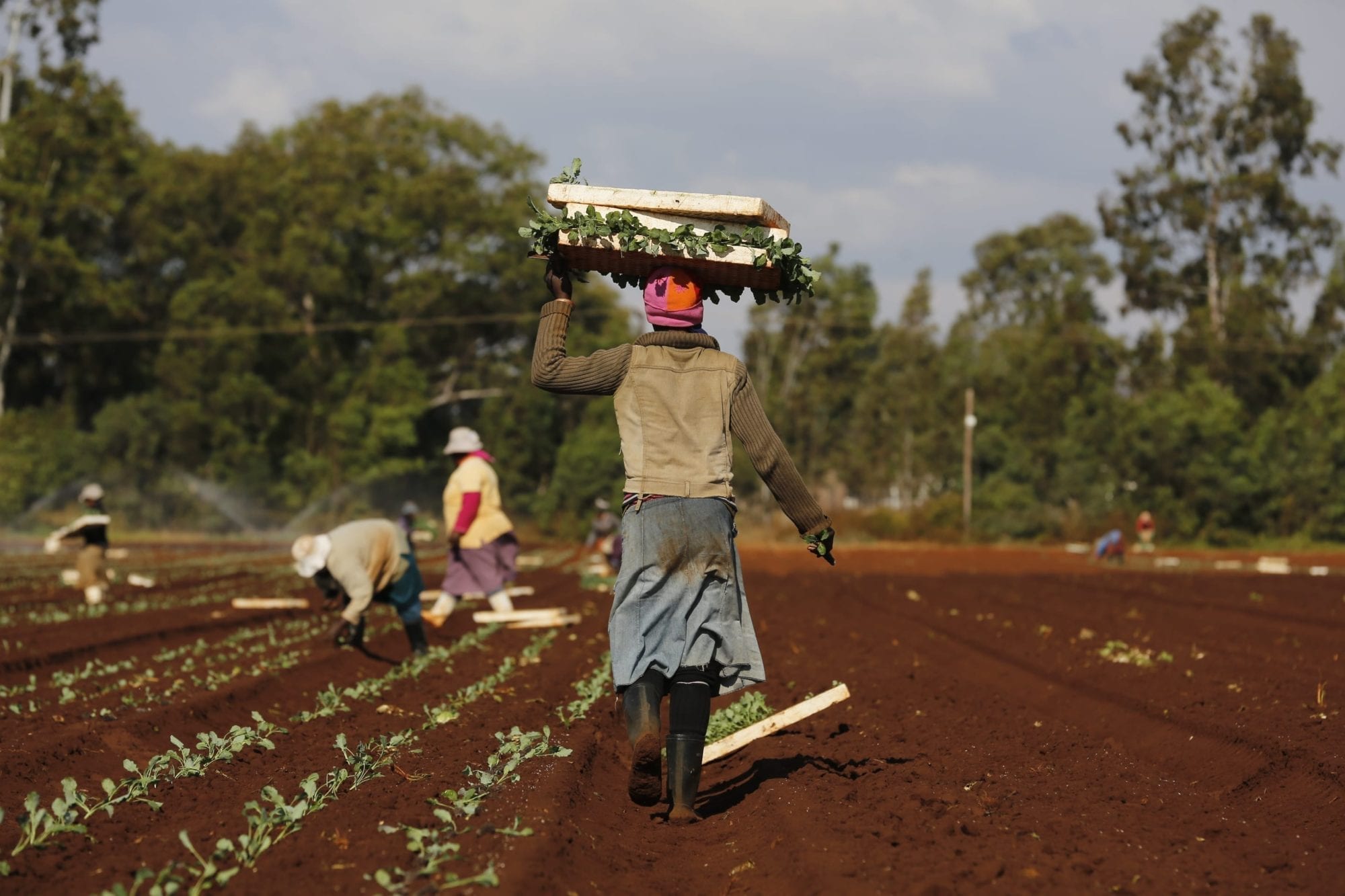
Feb 8, 2017
If working people could find good jobs, they would not be forced into a desperate search for employment in other countries, a process that means they often are exploited and abused, says Caroline Khamati Mugalla, executive secretary of the East African Trade Union Confederation (EATUC).
“If I have a decent job at home, I will not risk my life” to move for a job, she says. And unions are key to achieving decent work because they empower working people to join together to achieve living wages and safe working conditions.
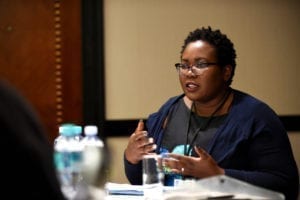
If working people could find good jobs, they would not be forced into a desperate search for employment in other countries—Caroline Mugalla, EATUC Credit: Solidarity Center/Evidence Holdings
Mugalla spoke today on the podcast, Working Life, where host Jonathan Tasini discussed labor migration in Africa, which involves the majority of the 34 million migrants across the continent.
Mugalla recently joined more than 130 participants at the Solidarity Center conference, “Achieving Fair Migration: Roles of African Trade Unions and Their Partners,” where union leaders and migrant worker rights advocates strategized on how to improve migrant worker rights in Africa.
Migrant workers contribute to growth and development in their countries of destination, while countries of origin greatly benefit from their remittances and the skills acquired during their migration experience.
Yet workers who migrate for jobs may be exploited by labor brokers who promise a job with good wages. When migrant workers arrive at their destination, says Mugalla, their passports often are taken and they are forced to work in low-paying, back-breaking jobs that bear no reality to what they were promised. Unions also push for decent work in destination countries, where they work with migrant laborers to ensure they know their rights and have access to legal and social support.
Migrant Workers Paid $1 a Day
Informal economy workers—market vendors, domestic workers—often are migrant workers. In East Africa, she says, the 7 million labor migrants are paid an average wage of $1 a day—enough to buy one meal—and live in cardboard houses with no plumbing.
“The informal economy does not give me access to basic, fundamental rights of an employee,” says Mugalla. “I do not have social security protection, I do not contribute to any pension scheme, I do not even earn a minimum wage.”
“Labor migration powers the world economy and lines the pockets of greedy corporations,” says Tasini. “The greed of corporations is a worldwide cancer and forced migration is also a tool of racism,” he says, pointing to the centuries’ long global slave trade.
Unions working to ensure that when migrant workers, who fuel the global economy, have full labor rights, standards will rise for all workers.
Listen to the full podcast.
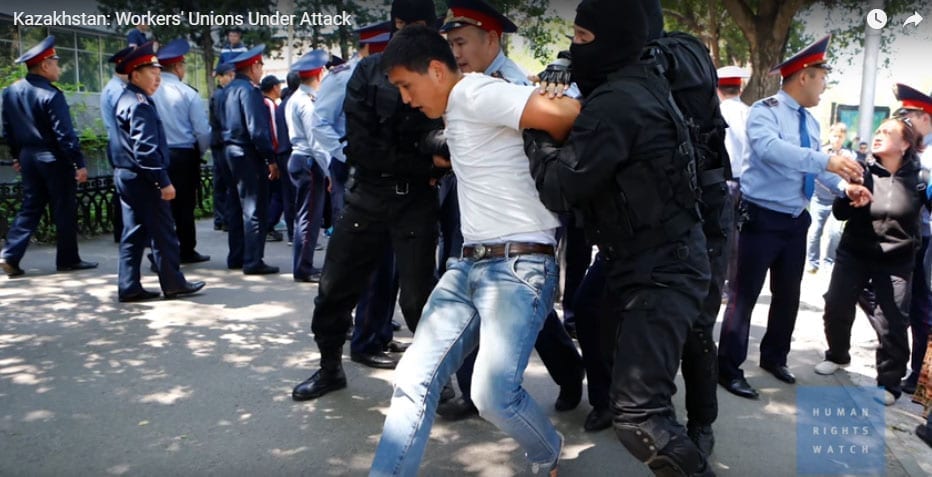
Feb 6, 2017
The arrest and detention of two union leaders in Kazakhstan marks an escalation in government attempts to silence unions it does not control.
KNPRK Deputy President Nurbek Kushakbaev and local union Chairman Amin Yeleusinov were arrested January 20 after oil workers, including the two leaders, began a hunger strike to protest the Kazakh government’s legal action to liquidate the confederation, while leaving intact a government-aligned federation. They were held in an undisclosed location for several days, union members told the Solidarity Center. Meanwhile, the government is engaged in a campaign to intimidate union members and to malign and discredit the KNPRK.
In a letter, the International Trade Union Confederation (ITUC) denounced the government’s failure to guarantee the right to freedom of association and called on it to withdraw the request before the Economic Court. The AFL-CIO, in a letter to Kazakhstan’s President Nursultan Nazarbayev, said: “The dissolution of independent trade unions violates the internationally recognized right of workers to form, join and participate in trade unions of their own choosing that are free from government control.”
Workers in Kazakhstan face steep obstacles to forming unions that will defend their interests. The country adopted an onerous trade union law in 2014 that marginalized independent unions in favor of the government-controlled federation. The International Labor Organization has repeatedly called on the government to amend its laws regarding freedom of association for Kazakhstan’s workers.









